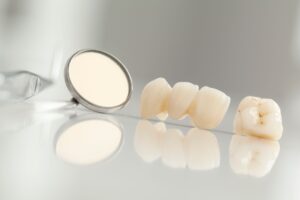Faulty Foundations: 3 Ways Your Dental Bridge Could Fail
July 3, 2024

Tooth loss can impact your life in several ways. Not only do spaces in your smile make it harder to eat and speak normally, but they can also impact your self-confidence. Fortunately, if you’ve lost one or more teeth in a row, then your dentist can rebuild your grin with a dental bridge.
These prosthetics contain the right number of artificial teeth (pontics) in between dental crowns that anchor to teeth or implants placed in your mouth. They’re used to close the gaps left by missing teeth to restore your mouth’s appearance and functionality. However, you must care for your dental bridge to keep it in good shape over the years. Continue reading to learn 3 reasons they might fail so you can prevent a potential problem!
Reason #1: Poor Dental Hygiene
Dental bridges have a crown on either side that is placed over the teeth on either side of the hole in your grin. They themselves cannot get cavities, but the pearly whites they’re anchored to are still at risk. Your restoration can become loose or dislodged altogether if the underlying teeth develop caries.
To avoid this common concern, you should thoroughly brush and floss your teeth twice daily to remove plaque buildup and bacteria that contribute to tooth decay and gum disease. This keeps your smile strong and gives your dental bridge a firm foundation.
Reason #2: Bad Habits
Although dental bridges are durable, they’re not totally invincible. If you’re an anxious nail biter or tend to nibble pen caps, then you could chip or crack them. Leaving these bad habits in the past can preserve your restoration so that you can continue to make the most of it.
Also, if you suffer from bruxism (chronic teeth grinding), you could prematurely wear down your prosthetics. All the extra pressure that’s exerted from constantly clenching your jaw can strain or fracture it. Thankfully, your dentist can address it with a custom-fitted nightguard to shield your smile.
Reason #3: Jawbone Degeneration
Many patients are shocked to learn that their jawbone starts to thin after tooth loss. Without a root to stimulate new bone growth every time you bite down or chew, your body begins to resorb mass that’s no longer needed for support. Eventually, your jaw can become too frail to support your remaining teeth.
That’s problematic for those with dental bridges because they attach to healthy pearly whites on either side of the gap in your grin to remain in place. If those teeth become unstable, your restoration could fall out. You may need to consider an implant bridge, which relies on titanium dental implants that are surgically inserted into your jawbone. They function like roots to keep your jawbone active and provide your prosthetics with a permanently embedded anchor.
With a few basic precautions, your dental bridge can potentially last 15+ years making it an excellent long-term solution!
About the Author
Dr. David Lloyd has years of experience helping people of all ages build and maintain happy, healthy smiles. He graduated from the prestigious Emory University School of Dentistry and is a member of several professional organizations, including the American Dental Association. He takes the time to get to know you so that he can build fully individualized treatment plans to meet your unique dental needs. He uses state-of-the-art equipment in a welcoming atmosphere to help you feel comfortable while simultaneously increasing the accuracy of your results. If you’re worried about your dental bridge and want a consultation, you can request an appointment on the website or by calling (386) 253-3629.
No Comments
No comments yet.
RSS feed for comments on this post.
Sorry, the comment form is closed at this time.
